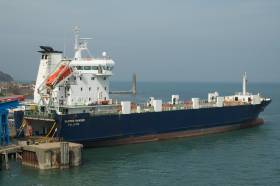Displaying items by tag: New Route: DublinBristol
Seatruck Launch New Dublin-Bristol Route
#NewRoute - Seatruck Ferries, the Irish Sea’s dedicated unaccompanied freight operator, has begun a weekend service connecting Dublin and Bristol.
The UK west coast port, Bristol is a major hub for car imports, and the connection allows car manufacturers to enter Ireland directly without the need for a UK trunk. The new service uses a Seatruck ro-ro vessel that would otherwise be idle at the weekend.
The operator which celebrates its 20th year has a network of three routes: Heysham – Warrenpoint (their first route) Dublin-Heysham and Dublin-Liverpool.
With the summer just gone, this is normally a quieter period, however, Seatruck Ferries have reported strong growth and new service offerings on its Irish Sea routes. During August alone, shipment of unaccompanied trailers was 24.9% increase compared with the previous year.
By operating to Heysham and Liverpool, this allows freight operators using unaccompanied trailer shipments to use their drivers and equipment more efficiently.
The English ports providing significant road mileage savings compared with the traditional transit by other operators through ports in Wales and Scotland.
























































